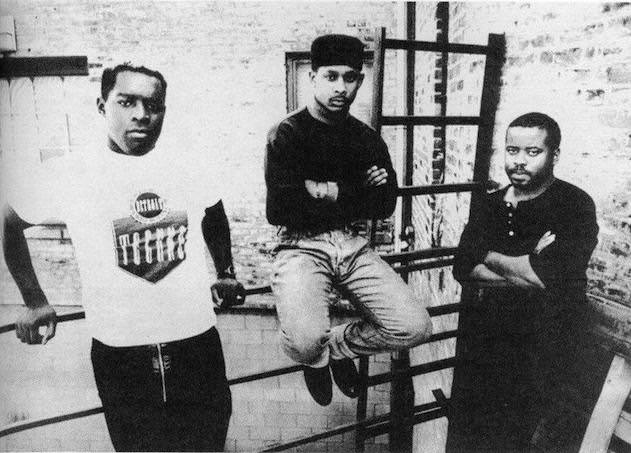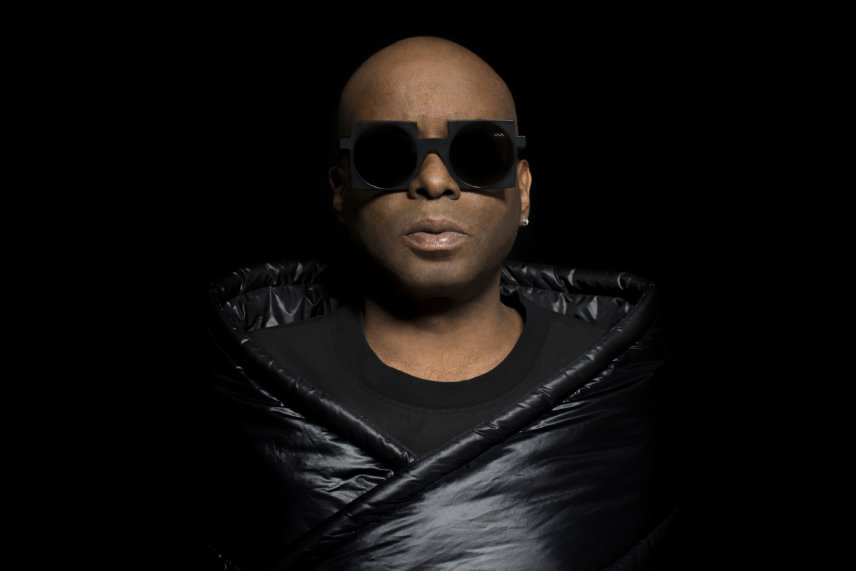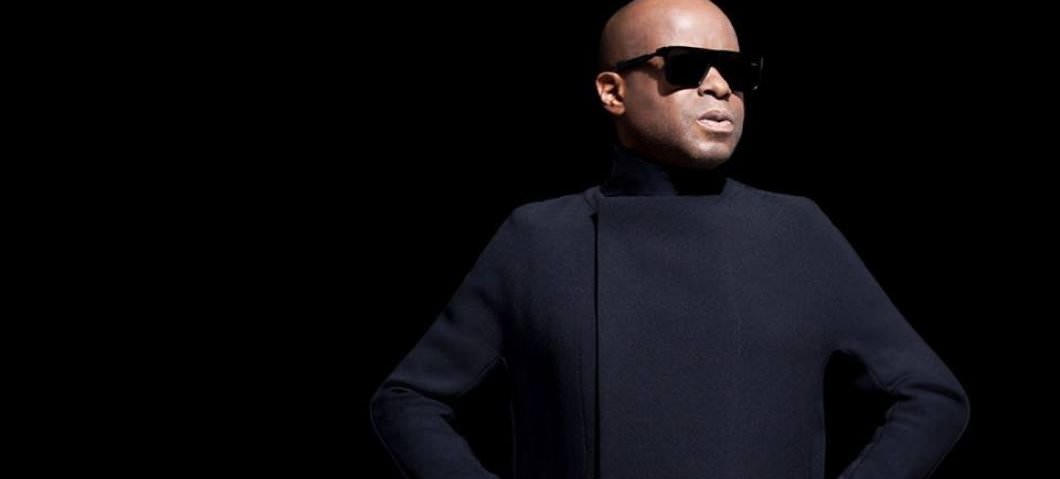Nadia Says meets with techno pioneer Juan Atkins to discuss technology, technique and techno.
It’s been a long journey in music for Juan Atkins. His 1982 electro classic ‘Clear’, co-produced with Rick Davis is widely acknowledged as a foundational techno track. Taking pointers from the robotic grooves of Kraftwerk, the cosmic-funk of George Clinton’s Parliament/Funkadelic and the ideas of writer and sociologist Alvin Toffler, Atkins was a key figure in the creation of techno. His late 80s recordings as Model 500 were hugely influential worldwide, steadily broadening the idea of what electronic dance music could be, producing beats and sounds that would be referred to for years after. His back catalogue is a decades-long endeavour to wrench emotion from machines. Juan Atkins provided a techno template that countless producers tried to emulate and his body of work has created musical ripples across the globe and across the decades.

So as an artist, if you coined the word techno as a genre of music, if you were one of the figures who helped create and develop it, and then continued DJing, producing and playing live worldwide for over 30 years, what would be next for you? For Juan Atkins, understanding what techno is beyond an electronic genre is where he’s at now. Connecting the dots between music, technology and visions of the future, adding in sound theory, the physics of vibration and a sense of what binds us all in our shared universe.
Together with Dr Swetlana Konkow, Atkins has been presenting his ideas about sound, music, frequency and vibrations in a series of ‘Respect The Sound’ masterclasses at Berklee, MIT as well as other music and technology schools worldwide. The lectures focus on his personal takes on music and sound theory, discussion of how sound waves and frequencies can affect the body and mind, and how ultimately everything in the universe is connected through vibrations.
Nadia: Firstly, I wanted to ask about your Model 500 and Cybotron shows. Can you tell us about your recent live performances?
Juan Atkins: I’ve been playing Model 500 live for the past 10, maybe 15 years now, and the first Cybotron relaunch show was at The Barbican in London last year. With Cybotron, I relaunched it as an audiovisual show, whereas with the Model 500 show we had visuals on some shows, but not as intricate as I do it with Cybotron. We’ve played three Cybotron shows so far, Primavera Festival in Barcelona, and then we played Dekmantel in Amsterdam. All of these shows were in 2019 with Laurens von Oswald and DJ Mako. Mako played a Novation keyboard and Laurens played modular synths and Ableton Push. But gear can vary, it depends on the show. And we like to experiment with new things.
If you come to see my live shows, you’ll see that now I’m using a Novation. It’s a new keyboard and it’s got some good sounds, is easy to get around, plus it’s got a vocoder on it. Other than this, I’ve been getting into a lot of virtual gear, plugins, and there’s so much stuff you can’t get through it all. It’s fun going through each plugin to see what each one does.
How do you find playing live and DJing is different from ten or twenty years ago?
Well, I’d say it is about technical differences. I mean it’s like, of course the technology has evolved since then, and with digital mediums like CDJs with USB drives and digital files, it’s opened up a larger selection of music. DJs used to basically almost play the same records because there was not that much music available in the early days. You very rarely find a DJ now that you would hear the same tracks or any of the same tracks in the set. It allows DJs to be a lot more dynamic. The same is true with the live music technology as well.
Do you feel techno as a genre is growing worldwide thanks to the democratisation of technology?
I think technology definitely will have an effect worldwide. It is already having an effect worldwide actually, and there is a lot of music that uses technological equipment that is not techno per se. Sometimes you’ve got to separate what’s called techno from the actual technology that’s being used to make the music, so there’s two ways of looking at it.
Where does techno fit in the world these days?
The word techno is short for technology, so usually where this music fits is… it’s a sign of progress, it’s a sign of evolution. So I think that’s something that’s going to always fit. And I don’t know that the city makes a difference. For me, I don’t make music specific to any city. For the world? Yes. But I don’t think that depending on where you hear it makes a difference.
Has there been a strategy to keep your music popular after so many years?
I mean there’s no explanation other than I guess I’m doing something right. It all goes hand in hand. The more people that you can play music for, the better. That must mean that more people like the music that I like.

Do you have different approaches for different audiences? Perhaps a different gig for an older audience rather than a younger crowd?
Well, I don’t correspond with the audience or with people that follow depending on their age. I mean, if you come to a Cybotron show or a Model 500 show then I’m assuming that you know what you’re there for. Or even me on a DJ set. So I don’t discriminate by age now. That said, yes, of course, we’ve been doing this for a long time and the audience is progressively younger than what it was 10, 15, or 20 years ago. The year 2020 is still fresh, new decade…
I think all music is basically an art form. The word techno being short for technology is self-explanatory. It shows how our society has basically evolved into a technological society, and it reflects in the art.
You mentioned your Barbican show. Had you considered your form of music would be performed in major art centres?
I can’t say that this is something that I thought I would be doing when I started, but at the same time, it’s definitely something that I think shows the maturity and the importance of this music, to be able to play on forums like that. It’s not a surprise, but it’s not that I was looking, that I knew that that was going to be something I was looking to do
Do you feel that techno is being recognized as a true art form?
Sure. I think all music is basically an art form. The word techno being short for technology is self-explanatory. It shows how our society has basically evolved into a technological society, and it reflects in the art..
Do you still get the same buzz being on stage as a performer?
Oh, yeah. Yeah, I mean it’s still fun. A part of making music, well for me anyway, is for the enjoyment of the people, to brighten up other people’s lives. Therefore, it’s always a good feeling to play music for people.
Do you sense crowds appreciated techno differently when it was arguably more underground compared with the mainstream sound of today?
Yeah, I think techno music has definitely become more mainstream, but I think also that people have now been cultivated with music and know it, so appreciate it more than in the beginning when nobody knew what it was basically and it was just a new sound. But I think people have come to appreciate it more so now.
When you get into the actual science of vibrations and sound waves, you can see how vibrations act in relationship to the makeup of the universe and how it can have actual spiritual connotations.
You say you perform for the enjoyment of others, but do you strive to entertain, educate, or demonstrate the power of techno?
Well, I think educate and entertain for sure, and I think in doing so, because I am doing techno music, it demonstrates the power of techno.
You’ve been researching sound in relation to techno, physics and the universe. Can you elaborate on your studies?
Well, that’s something that I am doing a lecture about now called ‘Respect the Sound’, where I talk about the relationship with sound and vibrations – and in relation to the universe. And a lot of people don’t know how important a vibration or sound wave is, as we’re all vibrating. And so, this is a topic that I can go on about forever.
I think that the vibrations that makeup sounds definitely affect our mind, our body and our soul. A lot of people don’t understand why certain songs make you sad, certain sounds make you happy, but certain sounds evoke different feelings because of the vibration. And low-frequency vibrations tend to stimulate more your inside, where higher frequencies are probably more cerebral. So, anyway. There you have it.Would you say your interest in this area is musical, scientific, or spiritual?
It’s all three. Well definitely from the technological advance aspect, that’s scientific, but music is spiritual to me anyway in terms of sound; sound is vibrations and vibrations create different moods and feelings, and it affects your cells, it affects your cell growth, it affects your mental state. When you get into the actual science of vibrations and sound waves, you can see how vibrations act in relationship to the makeup of the universe and how it can have actual spiritual connotations. If you look into how the whole universe was created, they say that the word of god is Om or Amen, which is a vibration… You said scientific, spiritual, and musical, well, yeah. It’s all. It’s all connected.
Follow Juan Atkins on Facebook and Twitter.
Nadia Says is a curator and writer based in Berlin. Follow her on Instagram and Twitter.
You currently have an ad blocker installed
Attack Magazine is funded by advertising revenue. To help support our original content, please consider whitelisting Attack in your ad blocker software.
x
